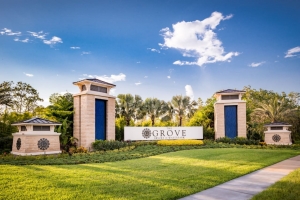How this condo-hotel property adapted its overseas biz to Covid-19
It’s tough right now to sell real estate during a pandemic, but imagine trying to sell a vacation condo to someone in another country at a time when no one wants to leave their home.
Challenges facing international buyers and sellers can include limited lending accessibility, fluctuations in currency value, getting foreign documents notarized and more.
One prominent property in Orlando that has found a way to overcome those challenges is The Grove Resort & Water Park near Walt Disney World, home to more than 878 condos and other amenities catering to Central Florida travelers. Within the past five years, the resort expanded its offerings with a new water park and activities area and plans to add a new 160-unit condo vacation property called The Terraces at The Grove Resort Orlando, which has not yet started construction.
The owner is Fort Lauderdale-based BTI Partners LLC, a real estate development and investment firm that also has local residential plans in the works. The company’s clientele — including travelers who also wish to invest in the states — spans 34 countries.
One of the faces at the helm is Kevin Mays, COO of BTI Partners. Mays leads the company’s real estate development efforts, such as the ongoing expansions at The Grove.
Here, Mays speaks with Orlando Business Journal about how the company has dealt with prospective buyers, financing and currency rates, as well as keeping business going when clients can’t leave their homes:
How have you addressed financing challenges? We created a seller financing program to get our backlog through due to some tightening on the lending side. That was a quick reaction we could make to help clients continue to get purchases closed. When the pandemic started, the knee-jerk reaction in lending for foreign nationals tightened up. [Lenders] didn’t want to underwrite those purchases because it was a bit risky. We came up with an underwriting criteria and mortgage program that met their needs to continue. We are financing the purchases internally and we’ve already has a couple of closings.
How are the banks now and will you keep financing sales internally? Banks are coming back now and saying maybe they can get back [into lending]. It’s better for us to have buyers go the traditional route. We are not in the finance business — that’s not a sector we plan to exploit.
How have you dealt with currency fluctuation for clients? We created a currency exchange program incentive. We’ve tried to help our international clients by making purchases a little more palatable based on the current [currency] fluctuations happening in their world. We do business with people from 34 different countries. We have international exposure and a lot of the currency exchange is not favorable [right now]. So we created a slower deposit [cycle] that gives people more time to get from contract to closing. That gives people an edge to the currency exchange changing so it’s favorable to them.
Why go through all this hassle? Why not just wait until conditions improve? The whole reason these two programs were created is there’s a mutual win-win. It helps us get to the sale or closing and it helps the buyer cost of entry.
What other ways has your business adapted to Covid-19? We made “remote closing.” So when you do [closings] with foreign nationals, they typically have to find a foreign [U.S.] attorney or go to the embassy. But we found a way to use technology where you never have to leave your house to buy a home. You can view a webinar presentation online and [go through] closing and title exchange all from your living room. And remote notaries have been really beneficial. That’s made it more convenient for the buyer.
What trends have you seen as Central Florida’s economy reopens? The theme parks opening up exudes confidence. There’s some pent-up demand [of people] wanting to get out of the house and travel. Our July bookings are up, which is terrific. We think the summer will be good and we will finish the year really strong.
The Covid-related travel downturn has been compared to other significant recessions, such as travel post-Sept. 11, 2001. How do you see this downturn playing out long term? I remember Sept. 11, 2001. After the initial [travel] impact, people still wanted to travel. I think we will experience the same thing here. I like to think that once there’s a vaccine found, things will get back to normal.







